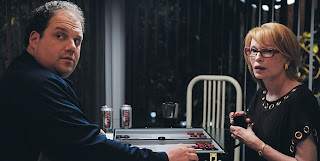Dark Horse
Written and Directed
By: Todd Solondz
Starring: Jordan
Gelber, Selma Blair, Mia Farrow, Christopher Walken, Justin Bartha, Donna
Murphy, and Aasif Mandvi
Director of Photography: Andrij Parekh, Editor: Kevin
Messman, Production Designer: Alex DiGerlando, Art Direction: Dawn Masi
“I
don’t dance,” explains Abe to Miranda in the opening sequence of Todd Solodnz’s
Dark Horse. The two sit silently and
awkwardly during a wedding, as every other person dances (in synchronization!)
to a catchy pop song. Abe seems like, for lack of a better term, a honest
guy—he might be overweight and totally awkward, but maybe his heart’s in the
right place. Miranda seems uninterested to say the least; her eyes shout, “get
away from me.” So how can these two imperfect souls be right for each other?
Well,
it helps if they are both essentially psychopaths underneath. Solondz’s films
are always about how the seemingly innocent world of today hides a world of
destructive mental states. His most acclaimed film, Happiness, follows the cheerful suburban life of people who dream
of intense sexual perversity (its spiritual sequel, Life During Wartime, went sadly unnoticed in 2009, though it’s just
as great).
If there’s anything surprising about Dark Horse, it’s how tame the film is compared to the dark, dark places Soldonz has driven us in the past. Our protagonist, Abe, is certainly wrong in his head, but his problems are more awkward than frightening. Played by Jordan Gebler, Abe is a guy with confidence boding on the outside, his egotistical nature hiding the fact that he still lives with his parents (Christopher Walken and Mia Farrow) and works for his dad’s company (though he assures someone that he was the most qualified candidate). Abe becomes unnaturally attracted to Miranda (Selma Blair, who now strikes me as Aubrey Plaza's future) after swiping her number at the wedding despite her complete lack of interest. He casually drives the three hours to her house in his oversized yellow hummer (a metaphor if there ever was one) and then after spending a couple hours with her, decides to propose.
Like Solodnz’s great works, Dark Horse never winks once at the
camera, and the director crafts the film as if he was making a high school
guy-meets-girl film (the catchy pop songs add to the stinging irony). His
characters wear their metaphors—Abe’s room is filled with neatly organized
action figures—and the dialogue crackles with absurd jokes, though no one
laughs. But the control is astounding, because Soldonz can make us laugh at
things that should turn us to tears—who else could make an STD like Hepatitis B
into a broad joke?
Solodnz’s films are ultimately
about our inner demons, so it’s somewhat disappointing as Dark Horse enters its final act by manifesting those demons. As Abe
becomes more disillusioned, visions his family and friends appear. Some of
these are fun and insightful—Donna Murphy’s double-sided performance as
faithful secretary-cum-cougar is delightfully absurd—but Dark Horse becomes more problematic as these characters decide to
directly explain Abe’s problems to him, and thus to us. Solodnz’s characters
love to speak in direct terms (Dylan Baker’s speech to his son in Happiness will always be an all time
classic), but there’s something how these demons continually list these issues.
It feels a bit sloppy for a director who often appears to have complete
control.
Dark
Horse ends in a bizarre series of sequences, its unclear why Solodnz feels
like putting Abe through what feels like unnecessary torture. Abe is a kid who
hasn’t grown up, but his punishment seems justified by, well what, really? The
whole ending, save for the perfect final shot (in which the director recognizes
the fantasies we all sadly share), feels staid and rushed, as if where the real
pain and melancholy Abe could have faced would be too difficult to show off. It’s
a shame, because like the film’s title suggests, this had a chance to be
Solondz’s secret masterpiece, but it sputters near the end.


No comments:
Post a Comment